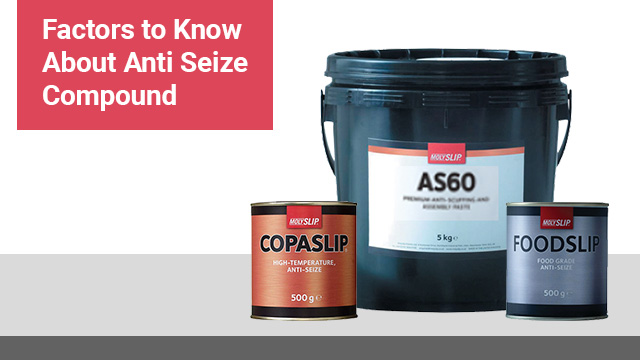Anti Seize Compound is an element that is generally applied to the bolts, flanges, fasteners and other interfaces used for clamping. It prevents the seizing and corrosion, galling, as well as lubrication, due to disassembly. You can find this compound in the form of coatings, pastes, and grease. It indicates that these compounds can be used on a wide array of materials and systems.
That makes the selection of the compound all too crucial for the businesses. If you choose the wrong compound, it can reduce the functionality of machines, and can do a lot of damage. Saying that, here is a detailed discussion about the Anti Seize Lubricant that can help you to choose the right one.
Why Use Anti Seize?
As the Copaslip compounds have a wide range of benefits, the companies use
it for different reasons. If applied correctly, the Anti Seize Compound can prevent the galling and pick up of the
fasteners at the time of assembly. It also produces a precise and consistent clamping
load in the fasteners.
With the help of these compounds, you
can lubricate and separate surfaces of the joint interfaces during the
operations. The application of such compounds reduces the loosening and wear
and tear of the interfaces. Copaslip
prevents water ingress and chemical attack on the interfaces as well. It also
reduces the chances of damage to the interfaces during the assembly.
Where
Should You Apply The Anti Seize?
Whenever required, a thin layer of
anti-seize should be applied to each of the interfaces of the assembly. The Molyslip Copaslip would protect the
interfaces if it is applied correctly.
The anti-seize should be applied to the
thread of the bolt and stud, as well as the unthreaded section. It should also
be applied to the section under the bolt face. Make sure to apply the anti-seize
to the nut face and all over the washer if you are using one.
How
Much Should Be Used?
You should not use too much of the Anti Seize Lubricant on the surfaces. A
thin layer is more than enough to offer you the coveted results. However,
consider the specific condition of the system to determine how much anti-seize
would be perfect for it.
 Reviewed by UNA General Trading
on
December 14, 2020
Rating:
Reviewed by UNA General Trading
on
December 14, 2020
Rating:







No comments: